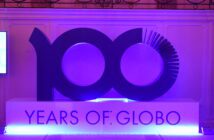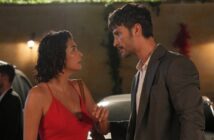Left to right: Moderator Stewart Clarke, editorial director of Informa Telecom & Media; Rogue creator/writer Matthew Parkhill; actress Thandie Newton; Greenroom executive producer Nick Hamm; DirecTV entertainment VP Patty Ishimoto; Entertainment One president Peter Emerson.
Created by Matthew Parkhill, Rogue revolves around a morally-conflicted undercover cop, played by Thandie Newton. Shortly after losing her son in a suspicious shooting, she gets kicked off the force and decides to go rogue to find her son’s killer.
The « serialised thriller », in the styleof classic whodunits, takes place over a 10-episode season.
Newton, best-known for the film « Crash« , said the project interested her because « the division between film and TV is getting smaller. As cinema screens get smaller in multiplexes, home screens are getting bigger. People feel they can get the cinema experience at home. »
The sheer numbers that TV attracts are also very appealing, she admitted.
« The privilege of TV is that you have longer to delve into things. You can be more ambitious in your scope. But there’s no snobbism among actors about working in TV; that’s all changed. People love drama on television. »
« What’s going on is a sea change in how content is distributed, made and financed, » said Nick Hamm. « What you’re looking at now are different financial models for the creating of shows in America. Those models are the old independent movie model. »
Ironically, the indie film business has all but died in the last few years, corresponding with a rise in American drama. Hamm believes this is because financers have migrated from one to the other; talent has, too.
« You have this enormous renaissance in North America, led by HBO’s incredible shows. This proved that there is a sophisticated adult audience out there who will pay for bespoke content. That is the antithesis of everything we’ve been told about TV over the last 25 years. TV is now in a much more bespoke field than it’s ever been before, » said Hamm.
« As network TV withers on the vine with its insistence on an archaic model of making shows, they’ll borrow stories and talent from the independent sector. »
This will lead to line-blurring between network and cable. « Because people migrate toward success, » said Hamm, priming us all for more sea changes.
For now though, Rogue’s primary focus is the paid TV audience. But it also features tightly controlled digital elements, according to DirecTV’s Patty Ishimoto. In partnership with content network SheKnows, they prepared web specials that enable people to more deeply explore the Rogue universe.
« We wanted Rogue to have a singular vision, » said Entertainment One’s Peter Emerson. « We wanted them to have the ability to execute; there was no other broadcaster involved. We set up a UK coproduction to access great talent from Europe. » Notably, four of Rogue’s directors are European, a creative composition Emerson calls « Europudding. »
In the end, « it’s about making great TV, » said Emerson. « There weren’t copious notes from the international side; we just wanted Matthew to execute. »
« We were very conscious of what’s come before us, » said Parkhill, referring to crime classics like Scarface, Goodfellas and the Sopranos. « We were standing on the shoulders of giants, which affected our setting: we didn’t want to go somewhere that had been recently explored in American crime. »
While exploring new opportunities for a crime drama to unfold, Parkhill also passed a lot of creative autonomy down.
« I don’t care if an idea comes from the person who makes coffee. If someone’s got a good idea, it’s a good idea. It’s your job to listen to them, and your responsibility to decide which ones to adapt and use, » said Parkhill. « The more you can set creatives free within the parameters of the vision, the more likely they’ll do their best work. »
Newton agreed. « It was liberating to know that the core of the project came down to us. I felt much more responsible; ultimately it makes the piece stronger. »
Meanwhile, Parkhill’s already begun to ruminate on Season 2.
« For me there’s a Rogue brand, » said Parkhill. « It’s a smart, character-led thriller with a strong emotional heart. » The challenge is « finding a way to renew the show so that every season you tell a 10-hour standalone movie. »




